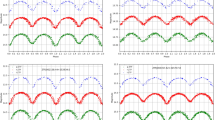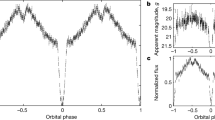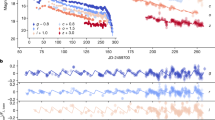Abstract
THE recent discovery of several binaries with periods in the range of a few hours has raised the problem of their past evolution. Three eclipsing binaries are in that group: the old nova WZ Sge, EX Hya and VV Pup. I shall confine myself to the case of WZ Sge, for which the largest amount of data is available. Krzeminski and Kraft1 have shown that the system is composed of a DA white dwarf, for which they estimate a mass M = 0.59 M⊙, and a secondary of mass m = 0.03 M⊙. The radii are R≃0.87 × 109 cm and r≃7 × 109 cm, and the separation a = 3.7 × 1010 cm.
This is a preview of subscription content, access via your institution
Access options
Subscribe to this journal
Receive 51 print issues and online access
$199.00 per year
only $3.90 per issue
Buy this article
- Purchase on Springer Link
- Instant access to full article PDF
Prices may be subject to local taxes which are calculated during checkout
Similar content being viewed by others
References
Krzeminski, W., and Kraft, R. P., Astrophys. J., 140, 921 (1964).
Zapolsky, H. S., and Salpeter, E. E., Astrophys. J., 158, 809 (1969).
Bondi, H., and Hoyle, F., Mon. Not. Roy. Astron. Soc., 104, 273 (1944).
Paczynski, B., Acta Astron., 17, 287 (1967).
Author information
Authors and Affiliations
Rights and permissions
About this article
Cite this article
VILA, S. Physical Sciences: Origin of the Ultra-short Period Binary WZ Sagittae. Nature 225, 1229–1230 (1970). https://doi.org/10.1038/2251229a0
Received:
Issue Date:
DOI: https://doi.org/10.1038/2251229a0
Comments
By submitting a comment you agree to abide by our Terms and Community Guidelines. If you find something abusive or that does not comply with our terms or guidelines please flag it as inappropriate.



